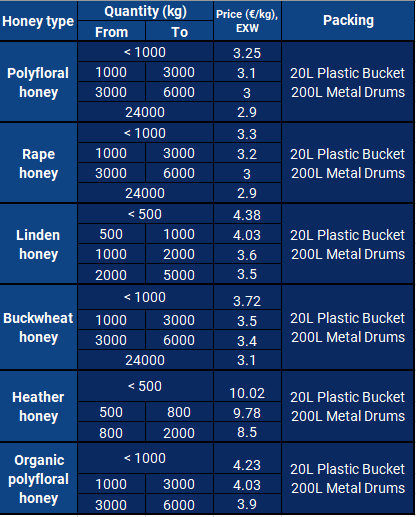The international honey market is affected by many factors that threaten its sustainability. Besides a declining bee population, the destruction of natural environments through increased agriculture and the increased use of pesticides have adverse effects on the total honey production and export. However, the global demand for honey keeps increasing, as it is a popular substitute for sugar. Furthermore, the health benefits of honey are increasingly sought after by many health-conscious consumers.
Between 2014 and 2018, the total export value of honey decreased by 4%, from 2.36 billion USD to 2.26 billion USD. This is mainly due to a decrease in price, as the total volume exported actually increased by 18.2% from 586.5K tons to 693.3K tons. The decrease in price is due to a problem very specific to the honey market: adulterated honey. Honey is one of the products that is most susceptible to this form of food fraud, also called economically motivated adulteration. Adultering honey is done by diluting honey with syrups, feeding the hives, and using antibiotics and other chemicals, leaving residues in the honey. This massive adulteration has driven the price of honey down over the last few years, despite increased demand.
A lot of companies are trying to combat this scandal of honey adulteration by focusing on the traceability of their honey. An example is Apiproduktai, an exporter of bee products from Lithuania. Although Lithuania is only a small exporter of honey - it only exported 3.1 million USD in 2018 - it is non-industrial and thus ideally suited for the production of honey and other bee products. Polyfloral honey is the most commonly produced honey variety in Lithuania. The country also offers monofloral honey such as rapeseed or buckwheat honey.
Compared to southern honey-producing countries such as China and Argentina, the blooming period is much longer in Lithuania. Due to the longer blooming period, the diastase is higher - up to 70 shade units - and thus the amount of enzymes is higher in Lithuanian honey. However, the working season of bees is around 3 to 4 months long in Lithuania, which is shorter compared to southern countries. The shorter working season affects the harvest quantity, so Lithuania cannot produce as much honey as these southern countries.
Apiproduktai’s conventional and organic bee farms are mainly located in wilderness areas without any industries, high-ways, and chemically polluted agriculture. This makes the company’s honey free from any form of chemical pollution. The company buys bee products directly from apiaries to ensure that the raw materials are of the highest quality. Each batch of honey has its own identification number so each batch can be checked and analyzed throughout the production process. Apiproduktai’s honey is without any further thermal and chemical processing, not homogenized and not adulterated with artificial sugars.
The main markets for Lithuanian honey are European countries such as Germany, Poland, France, Latvia, Estonia, and Russia, and the Baltic countries. The country and the company competes in the European market with quality. Apiproduktai’s honey contains a minimum of 75% of fructose and glucose, has a 3% saccharose content, and has an HMF value below 5 mg per kg. The price difference between conventional and organic honey is 30%. More detailed price information can be seen on the table below.




